China - Cable DTV Achieves Rapid Development in 2007
Friday, April 11th, 2008BEIJING — CCID Consulting, China’s authoritative ICT research and management consulting company, and the first Chinese consulting firm listed in Hong Kong (Hong Kong Stock Exchange: HK08235), recently released the 2007-2008 China’s DTV Industry Annual Report.
The report shows that China’s DTV industry achieved steady growth in 2007 and Cable DTV was still the principal part of analog-to-digital conversion. Driving by mass conversion of CATV to Cable DTV in 2006, 30 more cities completed the conversion in 2007. In October, national DTTB standard signals were telecasted in Shenzhen for the first time; development of satellite DTV was hindered by the postponed launch of the direct broadcast satellite and relevant policies have not been clarified; IPTV was still in the test period with a fast-growing subscriber population. In 2007, there were 13.052 millions of new DTV subscribers, 12.051 millions of which were Cable DTV subscribers, increasing the quantity of China’s DTV subscribers to 27.186 millions.
Figure 1, China’s DTV subscriber scale in 2003-2007
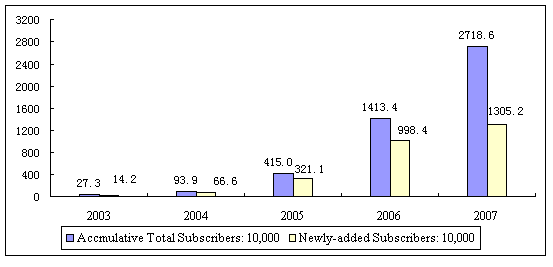
Source: CCID Consulting; Jan., 2008
Table 1 China’s DTV subscriber structure during 2003 -2007
2003 2004 2005 2006 2007
Number of Cable DTV
Subscribers: 10,000 16.8 77.3 369.4 1312.6 2517.7
Number of Satellite
DTV Subscribers:
10,000 8.5 10.7 13.8 22.3 32.3
Number of Terrestrial
DTV Subscribers:
10,000 0.2 1.3 5.1 23.5 49.9
Number of IPTV
Subscribers: 10,000 1.8 4.6 26.7 55.0 118.7
Total 27.3 93.9 415.0 1413.4 2718.6
Source: CCID Consulting; Jan., 2008
Mass conversion from CATV to Cable DTV takes the expressway
In 2007, Cable DTV operators accelerated operating platform digitization and infrastructure reconstruction and reinforced new service development on this basis. Technical and service capacities of CATV were improved, and the scale of the DTV industry has expanded rapidly. In 2007, the mass conversion from CATV to Cable DTV started in some western provinces, such as Inner Mongolia, Xinjiang and Gansu and was reinforced in major cities like Beijing, Guangzhou, Chongqing and Tianjin. The number of China’s Cable DTV subscribers topped 25 millions in 2007.
Table 2 Mass conversion from CATV to Cable DTV in China during 2003-2007
Number of Number of Analog-to- Number of
Year Cable DTV CATV digital unconverted
Subscribers: subscribers: proportion subscribers:
10,000 10,000 10,000
2003 16.8 10925.6 0.2% 10908.8
2004 77.3 11878.2 0.7% 11800.9
2005 369.4 12842.1 2.9% 12472.7
2006 1312.6 13725.6 9.6% 12413.0
2007 2517.7 14342.1 17.6% 11824.4
Source: CCID Consulting; Jan., 2008
By the end of 2007, the number of CATV subscribers in China reached 143 million and the mileage of CATV networks exceeded 3 million km. So far, there are 31 provincial network companies, 321 city-level network companies, 1,000 county-level cable networks and 2,000 special television networks in China. The demand for Cable DTV front-end platform construction and transmission network reconstruction is growing along with the expansion of network size and number of subscribers, and the Cable DTV industry in China is growing year by year in the process of CATV digitalization.
Cable DTV front-end platform is basically ready
DTV front-end devices, relative to subscribers’ terminal equipment, are fundamental devices of DTV network operators, which include coders, multiplexers, scramblers, adapters, QAM modulators, satellite flow transponders and network administration systems of such devices are the core of DTV operating system.
At present, China’s Cable DTV network operators are boosting the digitization: the majority of network companies at city level or above have completed digitization and half of county-level cable networks and most of special television networks have started digitalization and will complete in the next few years. In 2007, the sales volume of DTV front-end devices in China reached 313 million Yuan.
Figure 2, China’s DTV front-end device market scale in 2003-2007
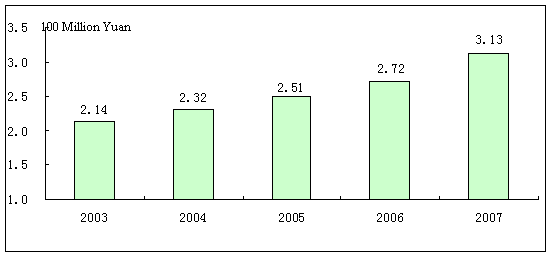
Source: CCID Consulting; Jan., 2008
At present, major manufacturers in China’s DTV front-end device market include both foreign manufacturers, such as British Tandberg, American SA, American Harmonic, Israel Scopus and American Bigband, and domestic manufacturers, such as Sumavision, Huawei, V- Shine and COMPUNICATE. It is expected that enterprises restructuring through acquisitions, mergers or even shutting down of business in likely in both international market and domestic market over the next few years and DTV front-end devices manufacturing would be concentrated to a few enterprises.
Figure 3, China’s DTV front-end device market structure in 2007
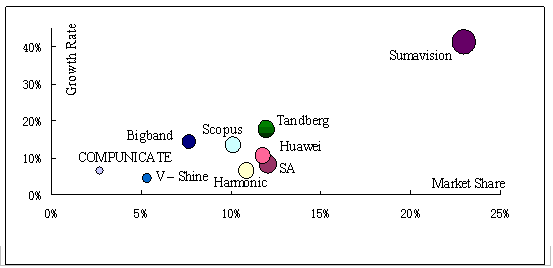
Source: CCID Consulting; Jan., 2008
FTTX (FTTH, FTTB) reconstruction drives development of DTV transmission devices
CATV networks transmission equipment mainly includes optical network transmission devices (optical transmitters, optical receivers, optical workstations and optical platforms) and cable transmission devices (amplifiers, branch distributors and so on). Presently, a great number of CAT networks in China have achieved the target of installing “optical fiber to residential districts”, while planning to have optical fiber coverage in buildings and even to the door, which will require doubled growth of network transmission devices.
In 2007, the network reconstruction of the vast majority of network companies above city level was in the initial stage and needs to be further developed; the reconstruction of cable networks and special TV networks at the majority of counties and cities had just started.
Figure 4, China’s CATV transmission device market scale and growth in 2003-2007
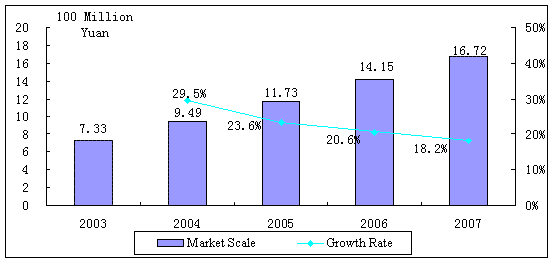
Source: CCID Consulting; Jan., 2008
Major CATV network transmission device manufacturers in China include EY, Kingtype, Wanlong, Photon, Makway, Leihua, Roton, ACE, Jiuzhou, Mike, Yinhe, Huawei and Jesmay.
Figure 5, China’s CATV network device market structure in 2007
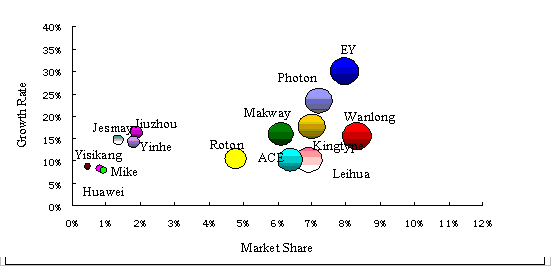
Source: CCID Consulting; Jan., 2008
In accordance with the timetable for converting CATV to Cable DTV in China established by SARFT, the number of Cable DTV subscribers should reach 30 million by the end of 2005, but this has not been achieved until now. Therefore, it is predicted that SARFT would further boost network reconstruction and mass conversion of subscribers in the next few years in the hope of completing transformation of all CATV subscribers to Cable DTV subscribers before 2015.
Table 3 Forecast of Conversion from CATV to Cable DTV in China during 2008-2012
Number of Number of Analog-to- Number of
Year Cable DTV CATV digital unconverted
Subscribers: subscribers: proportion subscribers:
10,000 10,000 10,000
2008 3968.1 14923.3 26.6% 10955.2
2009 5678.3 15442.6 36.8% 9764.3
2010 7658.6 15917.1 48.1% 8258.5
2011 9888.3 16339.4 60.5% 6451.1
2012 12348.3 16750.1 73.7% 4401.8
Source: CCID Consulting; Jan., 2008
Latest News
- Barb to start reporting TV-set viewing of YouTube channels
- SAT FILM selects multi-DRM from CryptoGuard
- Qvest and ARABSAT to launch OTT streaming platform
- ArabyAds & LG Ad Solutions partner with TVekstra in Turkey
- Freeview NZ satellite TV service to move to Koreasat 6
- Comscore expands YouTube CTV measurement internationally
